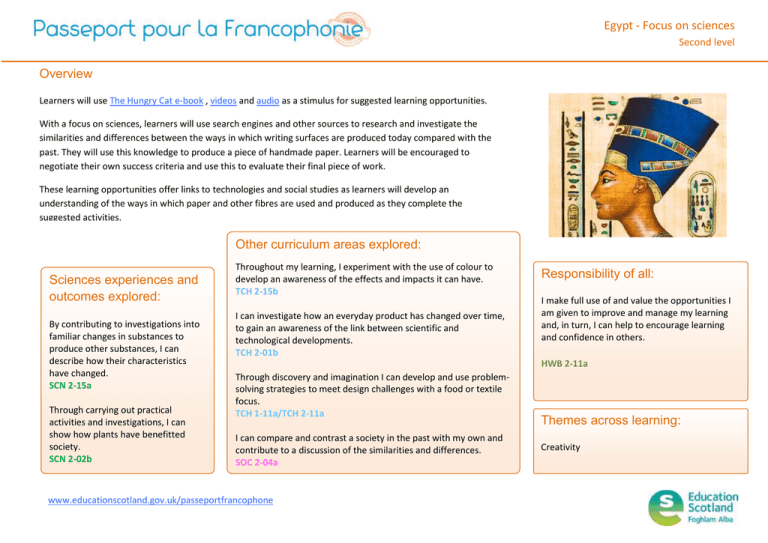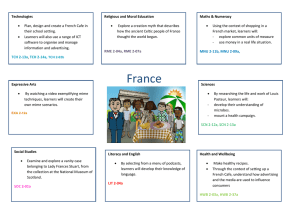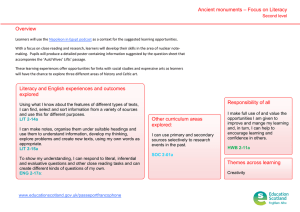Learning Journey Egypt - Focus on sciences Overview Second level
advertisement

Egypt - Focus on sciences Second level Learning Journey Overview Learners will use The Hungry Cat e-book , videos and audio as a stimulus for suggested learning opportunities. With a focus on sciences, learners will use search engines and other sources to research and investigate the similarities and differences between the ways in which writing surfaces are produced today compared with the past. They will use this knowledge to produce a piece of handmade paper. Learners will be encouraged to negotiate their own success criteria and use this to evaluate their final piece of work. Stirlin g Cas tle 260 These learning opportunities offer links to technologies and social studies as learners will develop an understanding of the ways in which paper and other fibres are used and produced as they complete the suggested activities. Other curriculum areas explored: Sciences experiences and outcomes explored: By contributing to investigations into familiar changes in substances to produce other substances, I can describe how their characteristics have changed. SCN 2-15a Through carrying out practical activities and investigations, I can show how plants have benefitted society. SCN 2-02b Throughout my learning, I experiment with the use of colour to develop an awareness of the effects and impacts it can have. TCH 2-15b I can investigate how an everyday product has changed over time, to gain an awareness of the link between scientific and technological developments. TCH 2-01b Responsibility of all: I make full use of and value the opportunities I am given to improve and manage my learning and, in turn, I can help to encourage learning and confidence in others. HWB 2-11a Through discovery and imagination I can develop and use problemsolving strategies to meet design challenges with a food or textile focus. TCH 1-11a/TCH 2-11a I can compare and contrast a society in the past with my own and contribute to a discussion of the similarities and differences. SOC 2-04a www.educationscotland.gov.uk/passeportfrancophone Themes across learning: Creativity Egypt - Focus on sciences Second level Learning Journey Overview of learning Possible prior experiences Possible learning opportunities Possible evidence Watch the The Hungry Cat ebook and videos. Learners use traditional methods and processes similar to those used by ancient Egyptians to produce a clay tablet or piece of simulated papyrus. Learners could draw upon their knowledge of hieroglyphics to inscribe the surface. This could lead on to paper making using a traditional deckle and mould. Observation notes Research the types of natural materials used to write on e.g. clay tablets, papyrus, parchment, paper Name the sources of these materials (plant, animal or mineral) Investigate how natural fibres are produced and treated to make writing surfaces Produce a frame for making paper Research types of writing surfaces used by peoples in the past and compare with those used today As a class learners could: Devise a list of success criteria for their writing medium, for example: - The type of surface that should be produced. - Materials that could be used to produce and decorate the medium. - Colours and fibres could be named in French and English. Within their groups, learners could: - Select the materials and methods that they will use. - Inscribe and colour the writing surface using traditional methods, colours and materials. Learners could devise reflective questions to help decide how effective their design is and to evaluate their partners’ work. For example: - To what extent does it fulfil the success criteria? - To what extent does the surface produced meet expectations? - Explain why the writing surface produced is useful. - Could it be improved in any way? After peer and self-assessment, pupils should have the opportunity to reflect and modify the process, comparing it to modern production. www.educationscotland.gov.uk/passeportfrancophone Success criteria checklist Planning sheets Photographs of the process Piece of writing media Piece of inscribed/decorated medium produced using traditional methods Evaluation sheets






